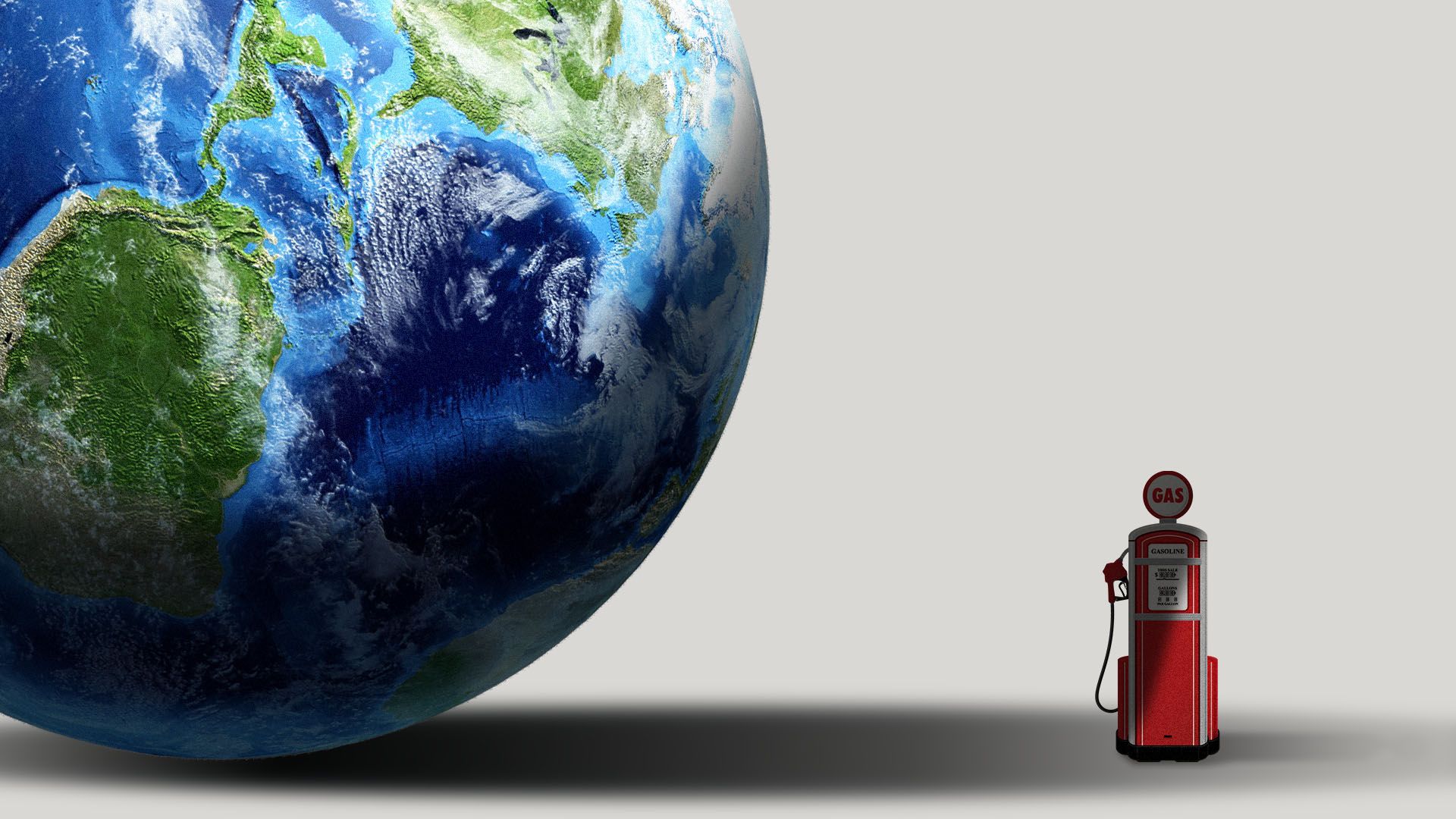What oil price shock? American worries turn to the environment
Add Axios as your preferred source to
see more of our stories on Google.

Illustration: Sarah Grillo/Axios
NEW YORK — The United Nations climate-change summit kicks off here today, a week after oil prices jumped more than they ever have in history.
The big picture: These two developments offer a window into how Americans view energy and the environment today — with relatively low oil prices making room to worry more about the environment.


Driving the news:
- The Sept. 14 attack on Saudi Arabian oil infrastructure knocked out 5.7 million barrels, more than half of the country's entire daily production. That led to a nearly 20% spike in oil prices on Sept. 15, the biggest jump in history. Gasoline prices, which are largely determined by global oil prices, have spiked in more than half the country.
- World leaders at the U.N. summit will commit more to drastically reduce heat-trapping emissions, which come largely from oil, natural gas and coal.
By the numbers: Oil prices have dropped and stabilized since the historic jump last week to hover around $60 a barrel. Pump prices, which rose a dime after the attacks to $2.66 a gallon, have also stabilized, according to AAA.
- These prices are still lower than they were earlier this decade. Crude prices hovered around $100 a barrel from 2011 to 2014, and national average gasoline prices were bumping up against $4 a gallon.
Fuel prices would have to remain elevated for a while — we're talking many months or years — to alter the fundamental shift in Americans' attitudes that has been building since 2014: putting environmental problems above energy affordability.
- Just 57% of Americans — a record low — say they are worried about energy affordability, according to Gallup data going back to 2001.
- By contrast, nearly three-quarters say they are concerned about the environment. That's near the record of 77%, a level that has been reached 3 times since 2001.
One of the biggest drivers of this public opinion shift has been America's boom in oil production, which has more than doubled since 2008. That has helped lower oil prices and thus gasoline prices since about 2014, which has in turn lessened people's concerns about fuel prices precisely because they've been low.
- America will never be wholly energy independent as long as we use oil and it's priced on a global market, but booming domestic production affords us a stronger security blanket, softening and limiting global impacts.
- The Saudi oil attacks sent Brent crude prices jumping to a little more than $72 a barrel. That's where prices were organically several months ago, according to Kevin Book, managing director of the independent research firm ClearView Energy Partners.
"Attaining some degree of energy security gives us the opportunity to think proactively about environmental issues."— Kevin Book, managing director, ClearView Energy Partners
What I'm watching: This dynamic gets at the heart of the challenge with energy costs and climate change. Fossil fuels, including oil, will need to get more expensive in order to drastically and swiftly reduce emissions to the level that scientists and U.N. Secretary General António Guterres say is needed.
- That would likely happen either by removing subsidies, taxing the fuels, or both, in order to change individual and corporate behavior.
- To be politically and economically sustainable, the cost increase would need to be gradual and not regressive on poorer people and countries.
- Geopolitical conflict is probably the least desirable way to get higher fuel prices. It’s like losing weight because you have an illness.
The U.N. chief convened a press conference last week to urge bold commitments on climate change at this week's events, yet he simultaneously warned against the impact of high oil prices as a result of the Middle East conflict.
“We absolutely need to create conditions to avoid major complications like we have seen with the immediate impact on oil markets. If there would be a major confrontation in the Gulf, it would have devastating consequences for the region and the world.”— U.N. Secretary General António Guterres
The bottom line: For big action on climate change to occur, it's not enough for Americans to just worry more about the environment. People will have to change their behavior — and that will only happen if fossil fuels cost more, not less.
Editor's note: This piece was corrected to show 5.7 million barrels of oil production is roughly half of Saudi Arabia's daily production (not all of its production).
